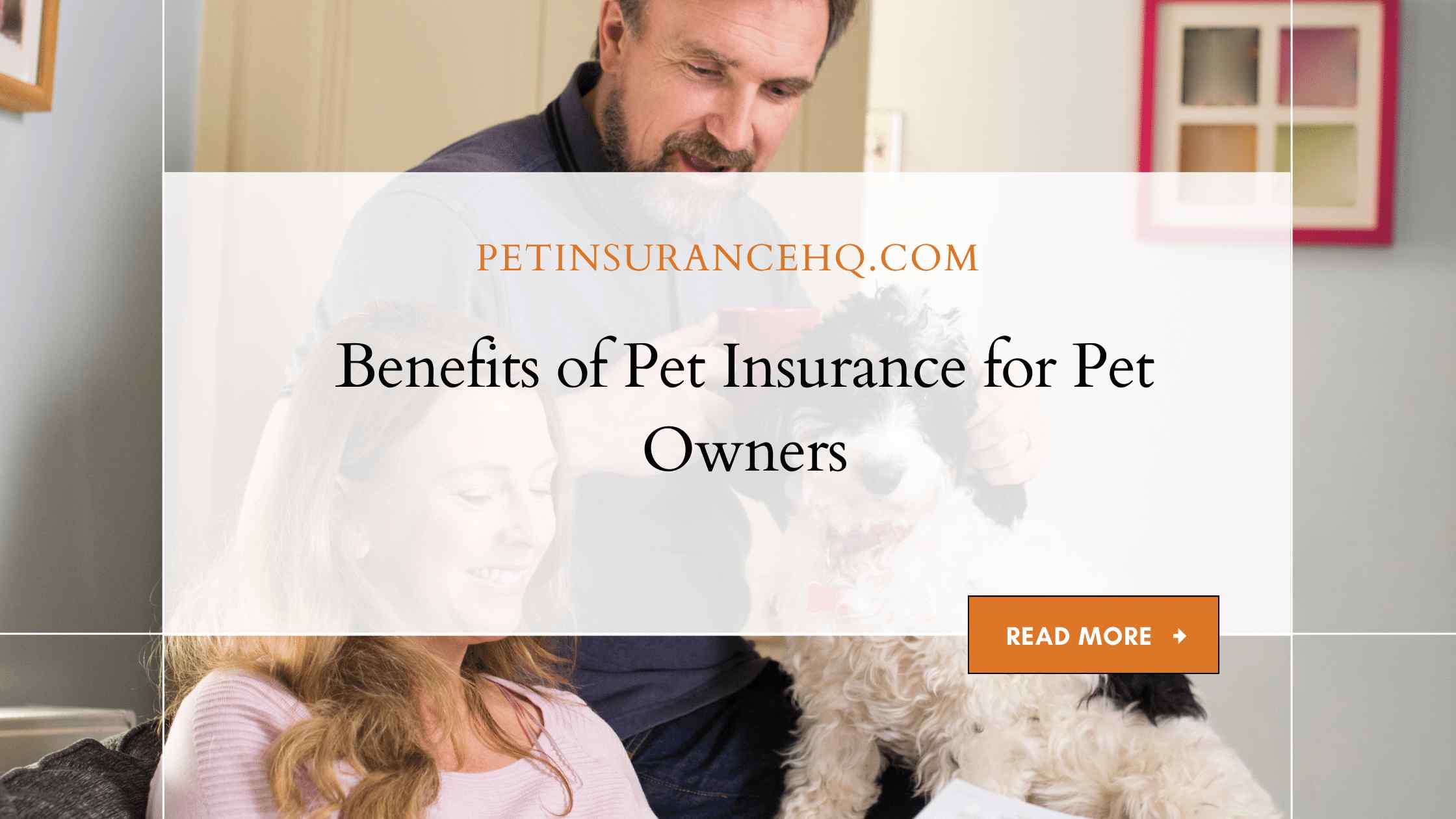The Benefits of Pet Insurance for Pet Owners
Attention all pet lovers! Whether you’re a proud owner of a floofy feline or a lovable canine, there’s no denying that pets are an essential part of our lives. They bring us joy, laughter, and unconditional love on a daily basis. However, just like humans, animals can also face unexpected illnesses and injuries that call for medical attention – which can undoubtedly leave your wallet feeling depleted. That’s where pet insurance comes in as the ultimate solution for peace of mind when it comes to caring for your furry friend.
In this blog post, we’ll explore the benefits of pet insurance and how it provides much-needed support for both pet owners and their beloved companions.
Introduction to pet insurance

Assuming you’re looking for an answer to the question “what is pet insurance,” pet insurance is a type of insurance that helps cover the cost of veterinary care for your pet. It’s similar to human health insurance in that it can help you pay for preventive care, routine care, and emergency care.
There are a few different types of pet insurance policies, but most of them will reimburse you for a portion of your vet bills. Some policies will cover preventative care, while others will only cover accidents and illnesses. And, like human health insurance, there are deductibles and co-pays involved.
The bottom line is that pet insurance can help ease the financial burden of veterinary care and give you peace of mind knowing that your furry friend is covered.
How does pet insurance work?
Just like insurance for humans, pet insurance is a way to financially protect your furry family member in the case of an accident or illness.
Most pet insurance policies reimburse you for a percentage of your vet bill, after you pay your deductible. The amount you’re reimbursed depends on the type of plan you choose. For example, some plans may cover 90% of your vet bill, while others may only cover 70%.
To get pet insurance, you’ll need to decide which type of plan best suits your needs and budget. Then, you’ll need to provide some basic information about your pet and yourself. Once you’ve chosen a plan and signed up, your coverage will begin immediately.
If your pet becomes ill or injured, you’ll need to take them to the vet and pay the bill upfront. Then, you’ll submit a claim form to your pet insurance company along with a copy of the vet’s invoice. Your claim will be processed, and you’ll receive reimbursement within a few weeks.
Pet insurance can be a valuable tool in protecting your finances if your pet becomes sick or injured. It’s important to do your research and choose a plan that meets your needs and budget before signing up.
Advantages of having pet insurance
Pet insurance is beneficial for pet owners in a number of ways. Perhaps the most obvious benefit is financial protection in the event of an unexpected veterinary bill. Veterinary care can be expensive, and pet insurance can help offset the cost of treatment.
Another advantage of pet insurance is that it can give peace of mind to pet owners. No one wants to think about their beloved pet getting sick or injured, but it’s important to be prepared for the worst. Pet insurance can help take some of the financial stress out of a difficult situation.
Pet insurance can help promote responsible pet ownership. Pets are a lifelong commitment, and pet insurance can help remind owners of that fact. By investing in pet insurance, owners are sending a message that they are serious about providing for their pet’s health and well-being.
Types of Coverage Available
There are a variety of pet insurance policies available, and the right policy for you will depend on your pet’s needs. Some common types of coverage include:
- Medical coverage: This type of policy covers your pet’s medical expenses, including office visits, vaccinations, prescriptions, and more.
- Dental coverage: This type of policy covers dental expenses, such as teeth cleaning and x-rays.
- Behavioral coverage: This type of policy covers expenses related to behavioral issues, such as obedience training and veterinary consultations.
- Accident coverage: This type of policy covers accidental injuries, such as fractures or lacerations.
- Lifelong coverage: This type of policy covers your pet for their entire life, provided that you continue to renew the policy.
Common Exclusions
Almost all pet insurance policies have exclusions for pre-existing conditions. This means that any medical condition your pet has prior to enrolling in a policy will not be covered. In addition, some policies exclude certain breeds of animals from coverage or charge higher premiums for those breeds. Be sure to check with your insurer to see if there are any exclusions that could affect you.
Budgeting for Pet Insurance
As a pet owner, it’s important to budget for pet insurance. Many people don’t realize the extensive benefits that pet insurance offers, including coverage for routine care, accidents and illnesses.
Routine care coverage helps to offset the cost of regular check-ups, vaccinations and other preventive care measures. This type of coverage is important in maintaining your pet’s health and can save you money in the long run.
Accident and illness coverage provides financial protection in the event that your pet becomes sick or injured. This type of coverage can help to manage the cost of unexpected veterinary bills, which can be very expensive.
Pet insurance can be very beneficial for pet owners, providing peace of mind and financial protection in the event of an accident or illness. When budgeting for pet insurance, it’s important to consider the type of coverage you need and the monthly premium you’re comfortable with paying.
Shopping Around for the Best Pet Insurance Deal
Pet insurance can be a great way to help offset the costs of unexpected vet bills. But with so many different pet insurance companies and policies out there, it can be hard to know where to start when shopping for the best pet insurance deal.
Here are a few tips to help you shop around for the best pet insurance deal:
- Compare Coverage and Cost
When comparing pet insurance policies, be sure to take a close look at both the coverage and the cost. Some policies may have low monthly premiums but offer less coverage than others. Other policies may have higher monthly premiums but provide better coverage. figure out what level of coverage you need and then compare prices across different policies to see which one offers the best value.
- Consider Your Pet’s Needs
Every pet is unique, so it’s important to choose a policy that meets your individual pet’s needs. If your pet has any pre-existing conditions, for example, you’ll want to make sure those are covered by your chosen policy. Some policies also cover preventive care, like routine vaccinations and wellness check-ups, while others do not. Consider what type of coverage is right for your pet before making a decision.
- Read the Fine Print
Once you’ve found a few potential policy options that meet your needs, it’s time to start reading the fine print. Each policy has its own set of exclusions and limitations, so you’ll want to be sure you understand what is and isn’t covered before signing on the dotted line. Pay special attention to any lifetime maximums or discounts offered by the policy, as well as whether the policy covers accidents only or both accidents and illnesses.
Shopping around for pet insurance can be time-consuming, but it’s important to make sure you’re getting the best deal possible. By comparing different policies, taking your pet’s needs into consideration and reading the fine print carefully, you’ll be able to find a policy that offers you peace of mind at a great price.
Conclusion
Pet insurance can provide invaluable support for pet owners who don’t want to worry about large, unexpected veterinary bills and the cost of caring for their pets in an emergency. Even though pet insurance may seem like a large expense initially, it can save you money in the long run by providing coverage for medical and surgical expenses related to your pet’s health or if something was to happen which made it impossible for you to financially care for them. It is important that you do your research before selecting a plan and make sure that it allows you the flexibility that best suits your budget and needs.







